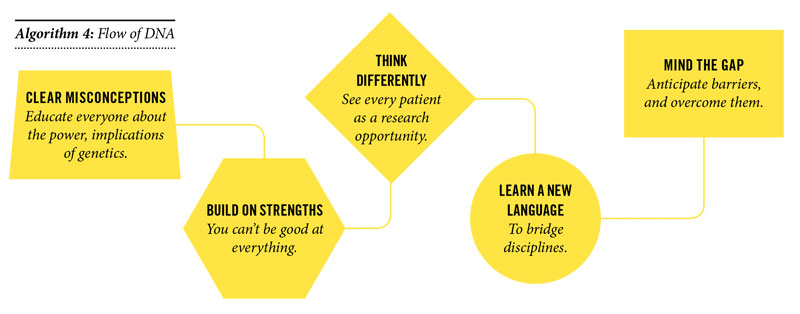Imagine a train barreling down a track that is not yet fully laid. So it is with genomic medicine. A feat once thought impossible, we can sequence a —3 billion base pairs of DNA—in less than a week for the price of a laptop. That was the easy part. What comes after is the greater challenge.
The ability to interpret our genetic blueprint promises new treatments and knowledge that will transform our entire understanding of medicine. “Right now, genetics falls under the umbrella of medicine,” says Chair of Human Genetics Lynn Jorde, Ph.D. “But it won’t be long until medicine falls under genetics.”
While successes roll in on a case-by-case basis, health care is not yet prepared for the complex procedural and ethical questions that are being unleashed on a grand scale. “We don’t yet know what it means to have a 20 percent increased risk of getting a certain disease,” says Nicola Camp, Ph.D., professor of genetic epidemiology, citing one example. “Is it responsible to give people information that scientists don’t fully understand?” According to the Food and Drug Administration, the answer is no. In March 2014, the federal agency prohibited the consumer-based genetic testing service 23andMe from releasing health information to its 650,000 customers. The conflict is a harbinger of what’s to come.
Genome interpretation and ethics are but a few of the missing pieces of a track that meanders through medical practice, technology, research and development. The points at which discovery and medicine intersect are where success stories emerge: a disease is diagnosed, new procedures are invented and illnesses are treated. “At an academic medical center, the interplay between research and medicine drives medicine to evolve,” says Chief Scientific Officer Dean Li, M.D., Ph.D. “It becomes a living being. It makes the wrong turns. It finds the right.”
Embracing genomic medicine means throwing away the cookbook and welcoming a culture of discovery that challenges practitioners to draw on their highest level of thinking and creativity. “Our patients are all opportunities to make discoveries,” says John Bohnsack, M.D., chief of pediatric rheumatology. Bohnsack makes a point of accepting cases that others won’t touch, and pursuing the most intriguing ones with basic scientists. His unorthodox approaches have led to a series of discoveries on the genetics of childhood diseases.
“Those discoveries are gateway discoveries,” says Li. “They don’t simply affect the individual, but all family members and all of medicine.” Following are examples of success stories laying the track that leads toward outliving our family history.


